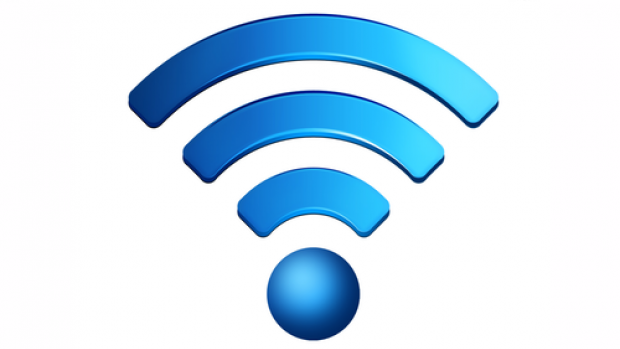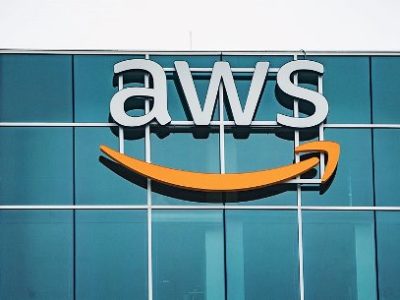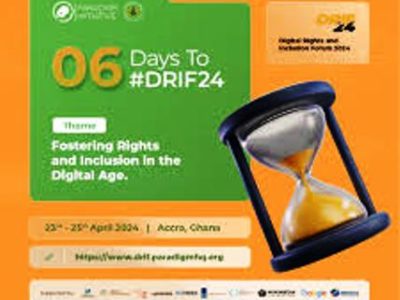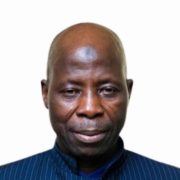For Nigeria, even as it struggles to improve its digital infrastructure, it is no cheery news from a global study released today on internet access in about half of the world’s economies. Africa largest economy is at the bottom of internet affordability. It occupies the 85th position of the 85 countries surveyed.
Privacy protection company Surfshark just released an in-depth analysis on internet affordability in 85 countries (81% of the global population): https://surfshark.com/blog/worlds-worst-internet-is-least-affordable
According to the study, Nigeria has the least affordable internet in the world. The country ranks 85th out of 85 indexed countries in terms of internet affordability and rates below Columbia and Honduras.
The graph below depicts how affordable the internet is in all countries compared with the global average.

The key findings of the study:
- Nigerians have to work 27 minutes 55 seconds for 1 GB of mobile internet (global average: 10 minutes).
- People living in Nigeria have to work 33 hours 42 minutes to afford the cheapest broadband internet (global average: three hours 48 minutes a month)
- Households in Africa and the Americas have the least affordable and the worst quality internet in terms of speed & stability.
- People living in Oceania have the most affordable internet access, followed by Asia and Europe.
The graph below illustrates the relationship between internet quality and affordability in each continent.
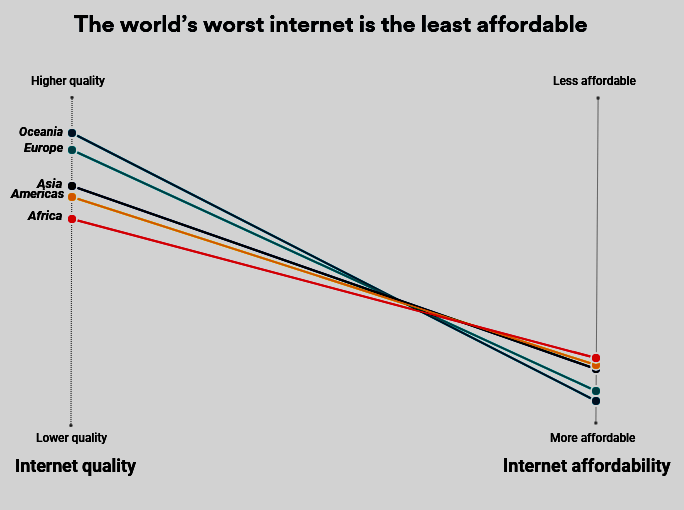

Global study: the world’s worst internet is the least affordable –
Africa and the Americas have the least affordable internet
A recent study on the Digital Quality of Life reveals the prevailing inequalities among countries in terms of internet affordability*. The research shows that 75% of the researched countries have to work more than the global average to afford the internet. Also, the findings suggest that often less affordable internet is not necessarily faster in speed or more stable.
“Any country’s digital advancement has a tangible relation to its economic potential and population’s overall wellbeing. In the COVID -19 era, it’s even more important as most of the employees face working full time online. Since work from home realities vary widely by location, Surfshark’s researchon internet affordability and quality aims to establish a common ground for further conversation,” said Vytautas Kaziukonis, CEO of privacy protection company Surfshark.”
People living in Oceania have th e most affordable internet access, followed by Asia and Europe. Meanwhile, households in Africa and the Americas reported significantly lower results than the global average. The DQL report shows that world regions where people on average pay the most for mobile and fixed broadband internet services also contend with the worst quality internet in terms of stability and speed.
For instance, people living in Africa have to work almost 11 hours a month to pay for even the cheapest broadband package and approximately 12 minutes for 1GB of mobile internet.
The world’s least affordable internet also happens to be the slowest. The average broadband speed in Africa is 4.85 Mbps (global average 15.94 Mbps), whereas mobile connection is 20.55
Mbps (global average 33.53 Mbps).
The issue of internet costs raises another question for households because, on a global average, individuals must work three hours and 48 minutes a month to pay for even the cheapest broadband package. However, this duration varies de pending on the location. In Nigeria, it is almost 34 hours; in Honduras, 10 hours; in the US, 52 minutes; and in Canada, 7 minutes.
There also exists a significant divide between the affordability of broadband and mobile internet. Globally, mobile internet is nearly 23 times more affordable than broadband. The average time of
work to afford the cheapest 1GB of mobile internet is about 10 minutes.
However, this duration varies by location: in Israel, it is 17 seconds; in Azerbaijan 19 seconds; in Poland, 24 seconds, and in Greece, it is 43 minutes; in Panama, it is 44 minutes; and in Honduras, 1 hour and 3 minutes.
The DQL investigation, covering 81% of the global population, ranks countries based on a set of five fundamental pillars. It defines the overall quality of digital wellbeing around the world. More key takeaways from the global study and an interactive country comparison tool can be found here: https://surfshark.com/dql2020
Key findings:
➔75% of the researched countries have to work more than the global average to afford theinternet
.➔On a global average, individuals must work three hours and 48 minutes a month to payfor even the cheapest broadband package.
➔The average time of work to afford the cheapest 1GB of mobile internet is about 10minutes.
➔Globally, mobile internet is nearly 23 times more affordable than broadband


